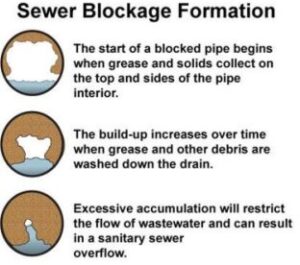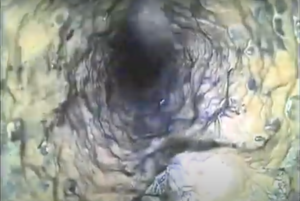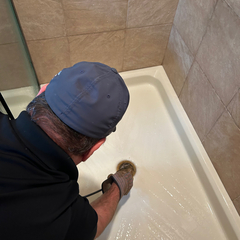Grease! The Hidden Enemy of Sewer systems
The Impact of Grease Buildup on Your Kitchen Drains and Sewer Lines
Grease, oil, sludge and fat (often referred to as FOG) might seem harmless when liquid, but they pose a significant threat to your plumbing system. It seems intuitive to dispose of grease and food waste down the drain but when poured down the drain, these substances solidify as they cool, creating a sticky buildup on the interior of pipes. Garbage disposals create a false sense of security as most people think that they can throw things down the drain but it make the problem worse! This is because of the fact that grease and debris combined actually create a greater blockage.
The Dangers of Grease Buildup
- Clogged Drains: Over time, grease accumulates, forming a thick layer that restricts water flow. This leads to slow drains, gurgling sounds, and eventually, complete blockages.
- Sewer Line Issues: If grease manages to bypass your home’s plumbing, it enters the main sewer line. Combined with other debris, it forms massive clogs known as “fatbergs,” which can cause severe backups and overflows.
- Environmental Impact: Fatbergs contribute to pollution of public sewer systems and cause billions of dollars in damage worldwide. Refer to this article here from the guardian explaining how much damage these things cause in the London public sewer system. They also increase the risk of sewer overflows, contaminating water sources.
- Costly Repairs: Removing grease clogs and repairing damage caused by fatbergs can be expensive.

Signs of a Grease Clog
- Slow Draining Water: If water takes longer than usual to drain, especially in your kitchen sink, it could be a sign of grease buildup.
- Gurgling Sounds: When you run water, gurgling noises coming from the drain indicate a potential clog, including grease.
- Bad Odors: A foul smell emanating from your drain is often a sign of decaying organic matter, including grease.
- Recurring Clogs: Frequent clogs in the same drain suggest a persistent issue, such as grease buildup.

(A picture taken in a from a sewer scope on how grease builds up in lines)
Prevention is Key
To avoid the problems associated with grease buildup:
- Scrape Plates: Remove excess grease from dishes before washing.
- Cool and Collect: Allow grease to cool and solidify before disposing of it in the trash.
- Use a Drain Strainer: Catch food particles and prevent them from entering the drain.
- Consider installing a grease trap. Most restaurants are required to have grease traps installed.
- Hydro- Jetting is proven to clear lines of grease and sludge and maintain the functionality of drainage lines.
- Regular Maintenance: Schedule to remove grease buildup before it becomes a major issue.
By following these simple steps, you can protect your plumbing system and help prevent costly repairs. Don’t hesitate to call us at 973-513-7751 or make an appt here for consultation!


